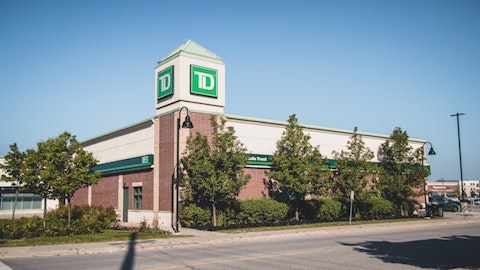Jeremy Barnum: Yeah. And I think that last point of Jamie’s is particularly important because, sure, if you want, you can construct as what I would consider a very optimistic argument that the higher cost of doing business will lead smaller-scale players to exit, and that’s a share gain opportunity for us. But I refer back to the comments about the disincentives to beneficial diversification and scale. Getting bigger, especially in Markets, it’s quite expensive from, for example, a GSIB perspective. And so you wind up kind of hemmed in on all sides, which is one of the reasons why we’re sort of highlighting that it does seem like the only way out sometimes when you look at the cumulative effect of everything that’s happened in Markets over the last 15 years is a fundamentally very different system. And well, obviously…
Jamie Dimon: Great opportunity for European market makers. I mean, a great opportunity. Like they can do repo and FX and swaps and credit and stuff with 30% less capital. That is a big difference in that kind of business.
Jim Mitchell: Great. That’s helpful. Thanks.
Operator: Thank you. Our last question comes from Matt O’Connor with Deutsche Bank. Your line is open.
Matt O’Connor: Hi, good morning. You talked about increased investment spend in some areas in response to an earlier question, but just how do you think about cost control overall looking at the medium term? The outlook for revenue is obviously pressured at least on net interest income, fees might help. But the backdrop is for potentially declining revenue or at least flattish revenue for a couple of few years. So I know you always say you want to invest for the cycle, and it’s really paid off over time, but how are you thinking about cost control in the next few years?
Jeremy Barnum: Yeah. I mean, I wish I had sort of an answer that fit better into your framework, but in some fundamental sense, we just don’t agree with the framework, in the sense that — and we’ve been through this over the last couple of years, right? In a world where rates drop very suddenly and recover like quite dramatically and credit becomes abnormally good and then rebounds, and you see these very significant fluctuations in capital markets. We saw that 2021 going into 2022 where the revenue environment can change a lot in the short term for reasons that can be largely out of your control. And while, of course, there are parts of our expense base, which are in the short term, directly sensitive to the revenue environment, and some of those adjust naturally and some of them we adjust more forcefully as a function of volumes.
But other things are much more structural. And the goal is to make sure that those other things are sized appropriately to what we believe sustainable through cycle returns are. So we’re always very focused on cost. You can be rest assured of that. That discipline internally is as aggressive as ever as we go through the budget cycle, but they’re long-term plays. And you really shouldn’t expect us to see trying to generate cosmetically lower cost in response to a lower revenue environment, where we didn’t balloon the cost when the revenue became, as we’ve argued, unsustainably high.
Matt O’Connor: Yeah. Fair enough. And then if I could just squeeze in on First Republic. Obviously, the contribution there is coming in at multiples higher than expected. How do you think about the puts and takes in terms of — I think there’s probably some runoff of loans still to come, but also opportunities to deepen the relationships there?
Jeremy Barnum: Yeah. So you’re right about the contribution and about the runoff of loans and it is notable, the net income, the First Republic-related net income that we printed this quarter. So the first thing to say is that we don’t think that, that First Republic-related net income number from this quarter is a sustainable indicator of the future run rate. Some of the same dynamics that we just talked about, in particular, overearning on deposits or sort of above-normal deposit margins also apply to First Republic franchise to some degree. So we would expect that to normalize. And probably more significantly, as I think you alluded to, we do have some accelerated pull-to-par on some of the commitments that we took on at a fair value discount as part of the acquisition.
And so that’s a short-term tailwind in the revenue that will come out of that over the next few quarters. And yeah, in terms of how it’s going overall and deepening the relationships, that remains a focus. And I think more of that will happen as we continue the integration and we continue stabilizing. And yeah, I think, as I said, I think, on the press call, things are going well, arguably a little bit better than we had sort of modeled as part of the acquisition, and we’re happy to see that.
Matt O’Connor: Okay. Thank you very much.
Operator: Thank you. There are no further questions.
Jamie Dimon: Thank you very much.
Operator: Thank you for participating in today’s conference. You may disconnect at this time.
Follow Jpmorgan Chase & Co (NYSE:JPM)
Follow Jpmorgan Chase & Co (NYSE:JPM)
Receive real-time insider trading and news alerts





